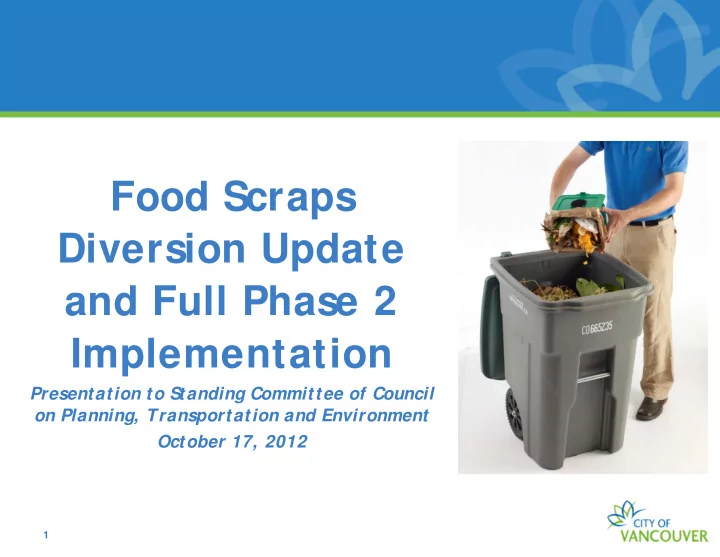

Food Scraps Diversion Update and Full Phase 2 Implementation Presentation to Standing Committee of Council on Planning, Transportation and Environment October 17, 2012 1
Outline • Context • Vancouver’ s Progress • S ingle Family food scraps recycling program – Pilot proj ect – City wide program expansion • S ummary/ next steps 2 2
Why divert food scraps from garbage? • Metro will ban disposal of all compostable organic waste (including food scraps) by 2015 – Metro Vancouver Regional IS WRMP • Greenest City 2020: – Zero Waste Target – Greenhouse gas emissions target • Diverting all food scraps and compostables from all sectors from landfill disposal would reduce greenhouse gases equivalent to taking about 10,000 cars off the road 3
GCAP 2020 Zero Waste Target: Reduce solid waste to landfills and incinerators by 50% from 2008 levels, from 480,000 to 240,000 tonnes 500,000 Compostables 450,000 (21% reduction) 400,000 EPR 350,000 (8% reduction) 300,000 Recyclables (6% reduction) 250,000 TARGET: 50% LESS SOLID WASTE 200,000 Construction & demolition TO LANDFILL OR INCINERATOR 1 50,000 (11% reduction) 1 00,000 50,000 Closed loop economy - (4% reduction) 2008 2009 2010 2011 2012 2013 2014 2015 2016 2017 2018 2019 2020
Vancouver’ s Progress to Date Phase 1 – Basic Compost April 2010 all houses in city • Raw fruit/ veg with yard trimmings • No collection changes Phase 2 – Expanded Compost • all foods and food-soiled paper – Phase 2A – Pilot: Fall 2011 2000 houses • weekly organics, every-other-week garbage – Phase 2B – Full Compost City-wide: Sept 2012 – Phase 2C – Collection Frequency Switch: Spring 2013 • weekly organics, every-other-week garbage 5
S ingle Family Food S craps Recycling Program 46% of household garbage can become compost Vancouver was one of the first cities in the region to start collecting food scraps from houses 6
Expanded Compost Pilot Launched Fall 2011 • 2000 homes in S unset and Riley Park • All food and food-soiled paper • Collection frequency change: weekly green bin and biweekly garbage 7 7
What We Found - Effect on Waste ~ 10%* ~ 39% ~ 2,000% increased from *requires further monitoring 0.12 to 2.31 kg/ hh/ wk 8
What We Found Key driver to maximizing diversion: • Every week green bin collection • Every-other-week garbage S upported by a comprehensive communications program. 9
Estimated Diversion Rate With Expanded Program Based on pilot results Collection Service Change 2013 10
Vancouver Blue Box Recycling Trend Blue Box Diversion 11
Food S craps Recycling Program Expanded Compost Final Phase 12
Phase 2 – City-Wide Food S craps Collection S eptember 2012: - All food scraps in green bins Winter 2013: - Communications and engagement Comprehensive multi-language May 2013: Collection switch begins 2 weeks per collection zone (green bin weekly, garbage every other week) 13
City-Wide Implementation Plan – Communications • Comprehensive community-based social marketing program • Multi-language • Built on success of pilot • Kitchen containers key tactic • Additional support for 311 – Increase in call volumes – Over 20,000 garbage cart and green bin change requests expected (based on Pilot) 14
Processing City-Wide Implementation Plan - Operations Transfer Collection 15
City-Wide Implementation Plan – Collections Collections 16
City-Wide Implementation Plan - Transfer 17
Organics Transfer Facility ($3-5 Million) • More space needed • Load receiving and inspection • Contaminant removal • S afely manage volumes • Odour control • Run-off control • Adj acent to VS TS 18
City-Wide Implementation Plan – Processing • Current processor is Fraser Richmond S oil & Fibre • Need for additional capacity • Exploring options 19
Proj ected Preliminary Budget (pending response to RFPs) Estimated Cost One-time Operating Costs: • Additional Cart Supply $568,000 • Cart Change Transactions Temp Staff & Equipment $830,000 • Collections Transition Temp Staff & Equipment $717,000 • Project Coordination Temp Staff $80,000 • Field Inspection & Enforcement Temp Staff $427,000 • Communications Plan Development & Execution $800,000 • Kitchen Container Supply & Distribution $720,000 • Distribution of Communications Materials (incl. staff) $300,000 • 311 Contact Centre – Temp Staff & Equipment $466,000 • 10% Contingency $490,000 Subtotal $5,398,000 One-Time Capital Cost: Transfer Capacity $5,000,000 Total $10,398,000 20
Proj ected Impact on Typical Year Annual Operating Costs Approximate Overall Budget Impacts (millions$) Program: Current Forecast Change Garbage $13.5 $10 -$3.5 Compostables $5 $11.5 +$6.5 $18.5 $21 +$3 21
Estimated Financial Implications Approximate Solid Waste Utility Fee Impacts Estimated Current Change Future Average combined garbage and green bin $209 $237 $28 cart fees 22
Food S craps Disposed in Garbage S ingle-Family Residential 26% City collection Commercial 50% Private sector Multi-Family collection Residential 24% Primarily private sector collection 110,000 tonnes per year total, or about 35% of all garbage going to landfill in Vancouver 23
Vancouver’ s Next S teps Phase 3 - Multi-family (MF) and Commercial sectors • Enthusiasm and interest from commercial sector and MF residents • Voluntary uptake to date in MF and Commercial uncertain • Unique challenges with MF in Vancouver (density): – S pace constraints within buildings – Dumpsters in lanes 24
Vancouver’ s Next S teps Phase 3 – Multi-Family/Commercial • Initiate process to introduce mandatory recycling of compostable organic wastes from all sectors • S trong signal to prepare for 2015 ban of organics • Develop strategy to accelerate uptake from commercial / MF • Working with Metro, BIAs, stratas and haulers • Report back to Council in 2013 25
Conclusion • Final phase of S ingle Family compost program is a huge opportunity to ramp up overall diversion • Complex, taken longer than anticipated • Unique challenges in Vancouver • Real progress, moving us closer to meeting GCAP 2020 targets • Next focus is MF/ commercial sectors 26
Questions? 27
Recommend
More recommend